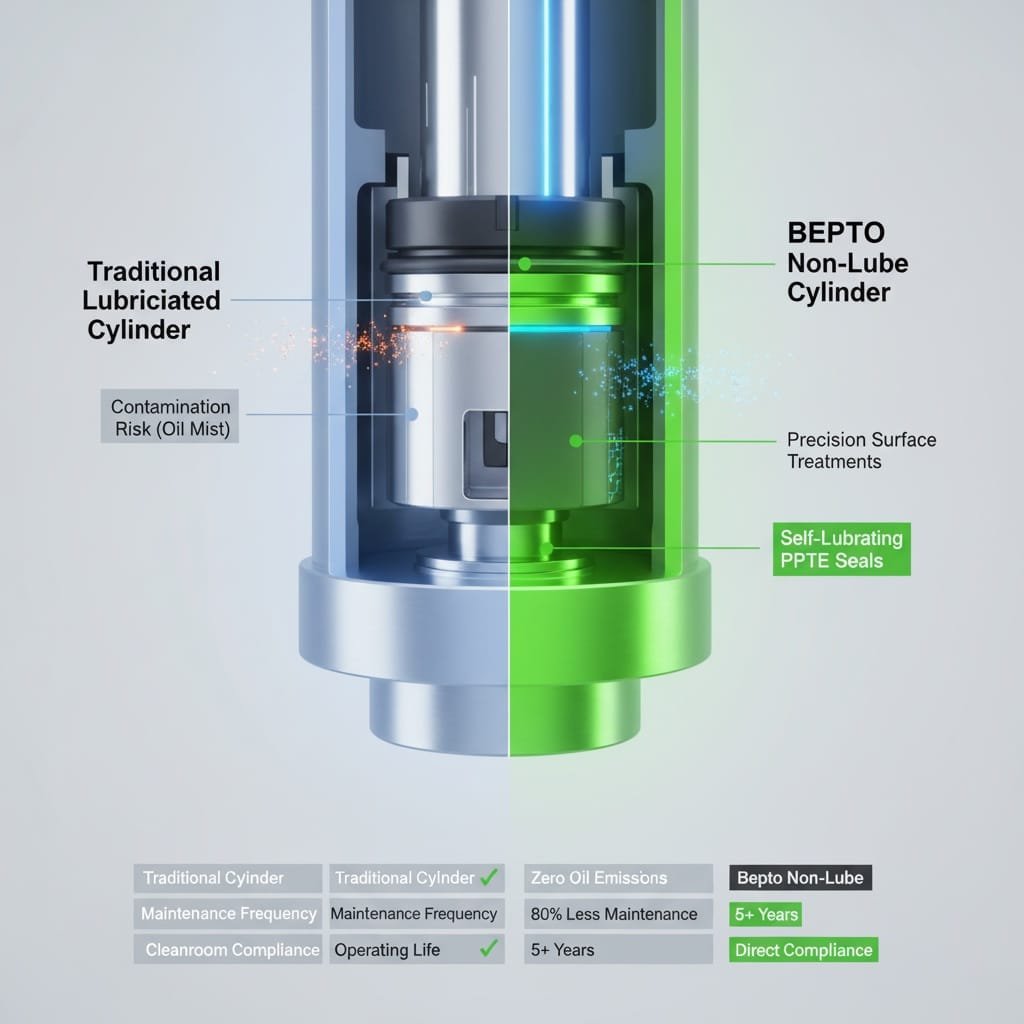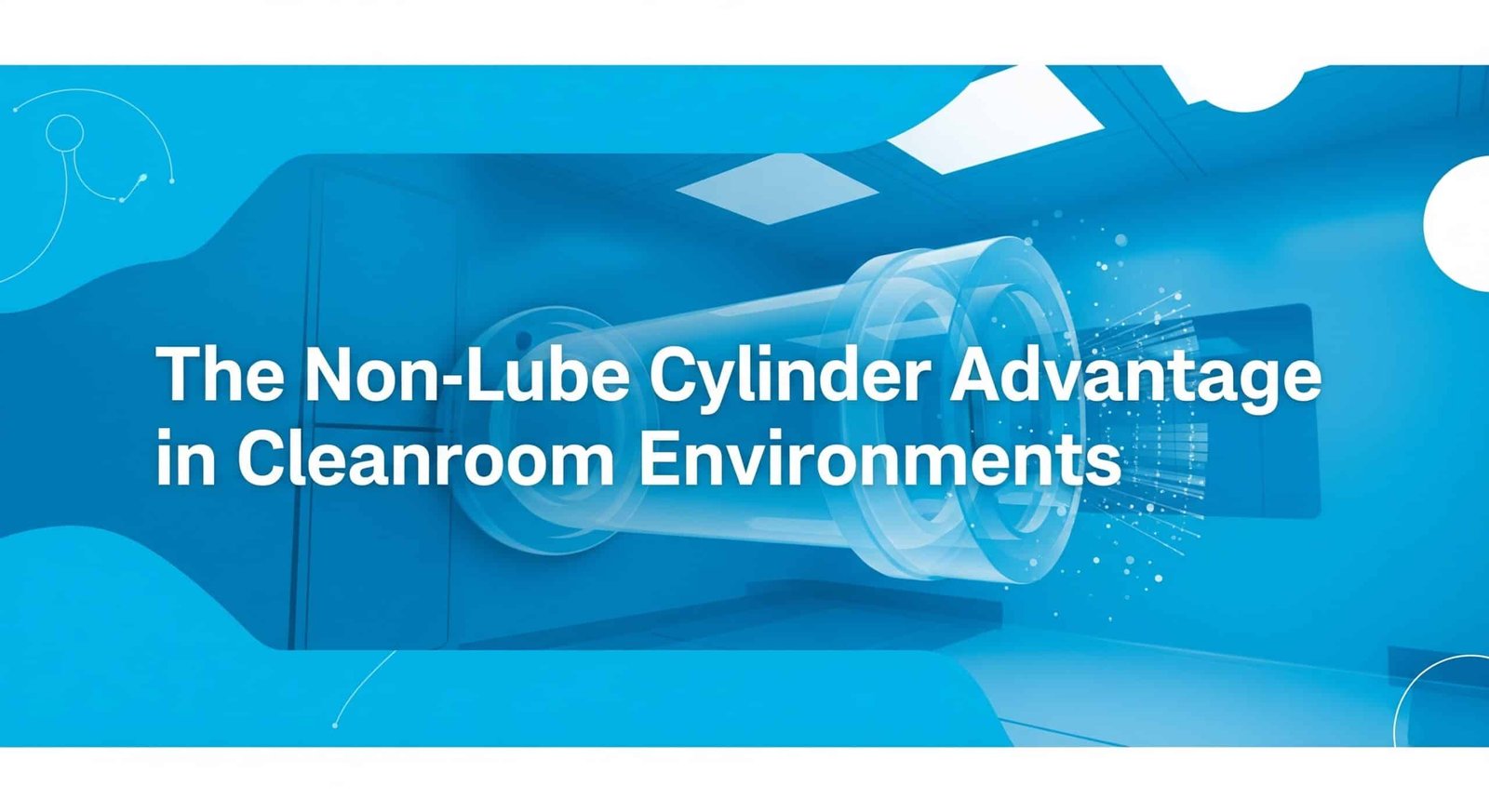Contamination from traditional lubricated cylinders can destroy entire batches of sensitive products, shut down cleanroom operations, and cost companies millions in regulatory compliance failures. A single drop of lubricant in a pharmaceutical or semiconductor facility can trigger costly decontamination procedures and production delays.
Non-lube cylinders eliminate contamination risks in cleanroom environments1 by operating without oil or grease lubrication, ensuring ISO-certified cleanliness standards while maintaining reliable pneumatic performance for critical manufacturing processes. 🏭
Last month, Sarah, a facility manager at a medical device manufacturer in Boston, contacted us after discovering that oil mist from their traditional cylinders had contaminated an entire production run worth $500,000.
Satura rādītājs
- What Makes Non-Lube Cylinders Essential for Cleanroom Applications?
- How Do Non-Lube Cylinders Maintain Performance Without Traditional Lubrication?
- Which Industries Benefit Most from Non-Lube Cylinder Technology?
- What Are the Cost Benefits of Switching to Non-Lube Cylinders?
What Makes Non-Lube Cylinders Essential for Cleanroom Applications?
Cleanroom environments demand absolute contamination control where even microscopic particles can compromise product quality and regulatory compliance.
Non-lube cylinders are essential for cleanroom applications because they eliminate oil mist emissions, prevent particulate contamination, meet stringent ISO cleanliness standards, and ensure consistent operation without introducing foreign substances into controlled environments.

Piesārņojuma novēršana
Traditional lubricated cylinders release oil particles and vapor that can settle on sensitive surfaces, contaminate products, and violate cleanroom protocols. Our Bepto non-lube rodless cylinders eliminate this risk entirely through advanced self-lubricating materials and sealed designs.
ISO Compliance Standards
Cleanroom facilities must maintain specific ISO 14644 classifications2, with Class 1 environments allowing fewer than 10 particles per cubic meter. Non-lube cylinders help maintain these strict standards by producing zero oil-based contamination.
Regulatory Requirements
| Cleanroom Class | Particle Limit | Traditional Cylinder Risk | Bepto Non-Lube Solution |
|---|---|---|---|
| ISO Class 1 | 10 particles/m³ | High contamination risk | Zero oil emissions |
| ISO Class 3 | 1,000 particles/m³ | Moderate risk | Aizzīmogota darbība |
| ISO Class 5 | 100 000 daļiņu/m³ | Some risk | Pilnīga atbilstība |
| ISO Class 7 | 352,000 particles/m³ | Manageable risk | Enhanced reliability |
Sarah’s Boston facility operates under ISO Class 5 standards for medical device assembly. After switching to our non-lube rodless cylinders, they passed their next audit with zero contamination violations, compared to three citations the previous year.
How Do Non-Lube Cylinders Maintain Performance Without Traditional Lubrication?
Advanced materials and engineering innovations enable non-lube cylinders to deliver reliable performance while eliminating contamination risks.
Non-lube cylinders maintain performance through self-lubricating polymer seals, precision-engineered surface treatments, advanced bearing materials, and optimized air flow designs that reduce friction and wear without requiring external lubrication.

Self-Lubricating Materials
Our Bepto non-lube cylinders utilize specialized polymer compounds that provide inherent lubrication properties. These pašeļļojoši materiāli3 reduce friction while maintaining durability over millions of cycles without degradation.
Virsmas inženierija
Precision surface treatments create micro-textures that trap air molecules, forming a natural lubrication layer. This technology, combined with our proprietary coatings, ensures smooth operation throughout the cylinder’s service life.
Advanced Seal Technology
Non-lube seals incorporate PTFE4 and other low-friction materials that eliminate the need for oil while providing superior sealing performance. These seals maintain their properties across wide temperature ranges and extended operating cycles.
Veiktspējas salīdzinājums
| Veiktspējas faktors | Tradicionālais cilindrs | Bepto Non-Lube | Priekšrocība |
|---|---|---|---|
| Piesārņojuma risks | High (oil mist) | Zero | 100% reduction |
| Uzturēšanas biežums | Weekly lubrication | Minimāls | 80% less maintenance |
| Operating Life | 2-3 gadi | 5+ gadi | Extended durability |
| Cleanroom Compliance | Requires filtration | Direct compliance | Simplified operation |
Which Industries Benefit Most from Non-Lube Cylinder Technology?
Multiple industries with strict contamination control requirements gain significant advantages from non-lube cylinder implementation.
Industries that benefit most from non-lube cylinders include pharmaceutical manufacturing, semiconductor production, food processing, medical device assembly, and aerospace manufacturing where contamination control is critical for product quality and regulatory compliance.
Farmācijas produktu ražošana
Drug production requires absolute contamination control to prevent cross-contamination and ensure product purity. Non-lube cylinders eliminate the risk of oil contamination in tablet pressing, packaging, and filling operations.
Semiconductor Production
Microchip fabrication environments demand Class 1 cleanroom conditions where even molecular-level contamination can destroy entire wafer batches. Our non-lube rodless cylinders support precision positioning without contamination risk.
Pārtikas un dzērienu pārstrāde
Food safety regulations prohibit oil contamination in production areas. Non-lube cylinders enable automated packaging and processing while maintaining FDA compliance and HACCP standarti5.
Medicīnisko ierīču montāža
Marcus, a production engineer at a surgical instrument manufacturer in Minneapolis, replaced their traditional cylinders with our non-lube units after oil contamination forced them to scrap $200,000 worth of sterile implants. Since the switch, they’ve maintained perfect contamination records for 18 months.
What Are the Cost Benefits of Switching to Non-Lube Cylinders?
Non-lube cylinders provide substantial cost savings through reduced maintenance, eliminated contamination losses, and improved operational efficiency.
Switching to non-lube cylinders delivers cost benefits including 70% reduction in maintenance costs, elimination of contamination-related product losses, reduced air filtration requirements, and extended equipment life that provides superior return on investment.
Uzturēšanas izmaksu samazināšana
Traditional cylinders require regular lubrication, filter changes, and contamination cleanup. Non-lube cylinders eliminate these maintenance requirements, reducing labor costs and downtime.
Contamination Loss Prevention
Product contamination can cost thousands or millions in scrapped materials, rework, and regulatory penalties. Non-lube cylinders eliminate these risks entirely.
Kopējās īpašumtiesību izmaksas
| Izmaksu faktors | Tradicionālā sistēma | Bepto Non-Lube | Ikgadējie ietaupījumi |
|---|---|---|---|
| Uzturēšanas darbs | $15,000 | $3,000 | $12,000 |
| Lubrication Supplies | $5,000 | $0 | $5,000 |
| Contamination Losses | $50,000 | $0 | $50,000 |
| Gaisa filtrēšana | $8,000 | $2,000 | $6,000 |
| Total Annual Cost | $78,000 | $5,000 | $73,000 |
The investment in non-lube technology typically pays for itself within 6-12 months through eliminated contamination risks and reduced maintenance requirements.
Non-lube cylinders represent the future of cleanroom automation, delivering contamination-free operation while reducing costs and improving reliability. 🎯
FAQs About Non-Lube Cylinders
Q: How long do non-lube cylinders last compared to traditional lubricated cylinders?
Non-lube cylinders typically last 2-3 times longer than traditional cylinders due to advanced materials and reduced wear. Our Bepto non-lube rodless cylinders are designed for 5+ years of continuous operation with minimal maintenance requirements.
Q: Can non-lube cylinders handle the same pressure and force requirements as lubricated cylinders?
Yes, non-lube cylinders match or exceed the performance specifications of traditional cylinders. Our engineering team designs each unit to meet specific pressure, force, and speed requirements while maintaining contamination-free operation.
Q: What is the initial cost difference between non-lube and traditional cylinders?
Non-lube cylinders typically cost 20-30% more initially, but deliver significant savings through reduced maintenance and eliminated contamination losses. Most customers achieve payback within 6-12 months through operational savings.
Q: Do non-lube cylinders require special installation or setup procedures?
Non-lube cylinders install using standard pneumatic connections and mounting hardware. They actually simplify installation by eliminating lubrication systems and reducing air filtration requirements compared to traditional cylinders.
Q: Which cleanroom classifications can benefit from non-lube cylinder technology?
All cleanroom classifications benefit from non-lube cylinders, from ISO Class 1 semiconductor facilities to ISO Class 8 packaging operations. The contamination elimination and maintenance reduction advantages apply across all cleanliness levels.
-
Learn the fundamental principles of cleanrooms and how they control airborne contaminants. ↩
-
See a detailed chart of the ISO 14644-1 standards that define cleanroom classifications. ↩
-
Explore the material science behind polymers that provide low friction without external lubricants. ↩
-
View a technical datasheet on the properties of PTFE, including its low coefficient of friction. ↩
-
Read an overview of the HACCP system for managing food safety from the FDA or a similar authority. ↩



